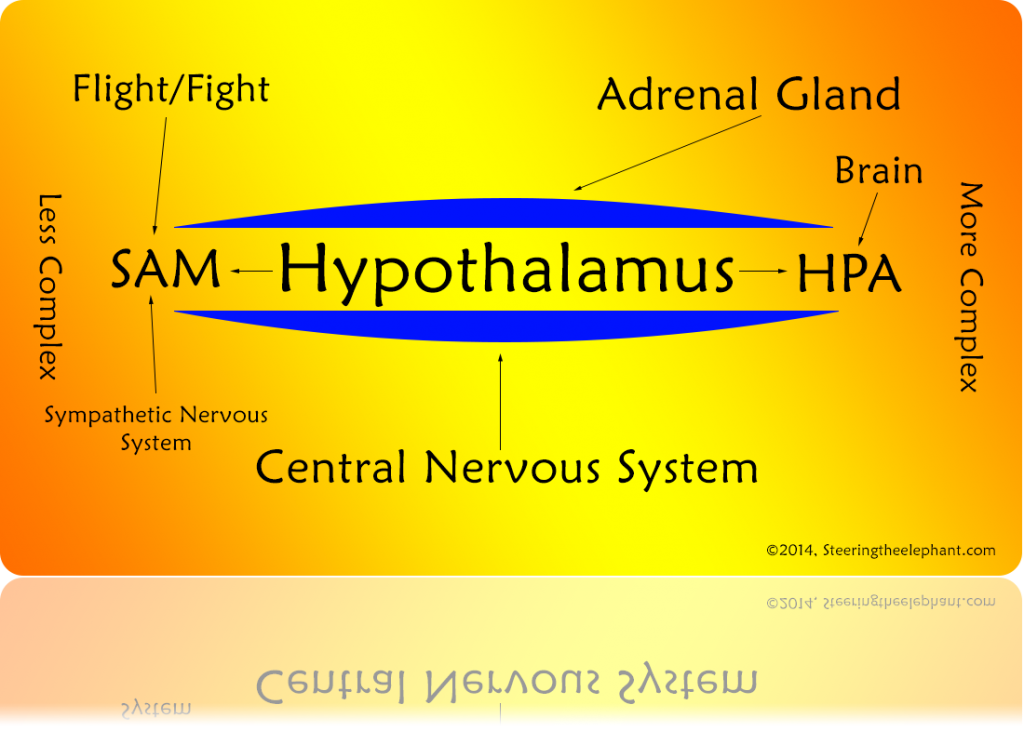Here is what you should know about what this is. Within you there is a systematic way to react to stressors, and most of the time the system works very well. At other times, this systematic process can work against itself which can degrade how you do things. If the systematic way you react to stressors works against itself for long periods of time, there is a very good chance that something on you will break.

The chart above depicts your body’s stress regulation system when reacting to daily stressors, in a very simplified way. The complicated (meaning scientifically dense) way is explained by Megan Gunnar and Karina Quevedo.
So what does the chart describe? It is describing the neurobiological reaction that helps us cope with stress. There are two systems in your body that react to stressors, the SAM, or sometime called SAS (sympathetic- adrenomedullary system), and the HPA (hypothalamic- pituitary-adrenocortical system). They are coordinated with each other by the hypothalamus. The SAM and HPA are on either side of the Blood-brain Barrier, a barrier that protects the brain from harmful things floating in your blood. The SAM is part of the sympathetic nervous system, the part that readies the body for flight or fight, and resides in the lower brain stem and spinal cord. It is on the opposite side of the Blood-brain Barrier from the HPA. The hypothalamus activates adrenal gland secretions along with central nervous system coordination to execute activation of SAM and HPA. SAM reacts to fast, fight/flight types of stressors, where as HPA reacts to more complicated, long term stressors.
Generally, the system can adapt to stressors and balance both physical and psychological needs, quite well. However, during prolonged periods of negative stress, some of the secretions that activated the HPA to enhance the reaction, also deactivate the HPA as a protection. So, if the SAM is still reacting to a stressor and the HPA is deactivating the system’s response to the same stressor, you got a problem. Continuously pushing the system beyond its capacity to adapt to a stressor can do harm to you…in all kinds of ways!
Regulating reactions to stressors is not the only function the hypothalamus is involved in. The hypothalamus plays a central role as the pacemaker for one’s circadian rhythms, which are behavioral and bodily processes that are modulated within a 24 hour time period and repeat every day. Waking and going to sleep, eating and defecating, changes in your heart rate and blood pressure throughout the day, and body temperature increasing in the morning and decreasing in the evening; are some examples of circadian rhythms. These internal rhythms are genetically coded and certain rhythms are affected by day-night light cycles. Disregarding circadian rhythms and day-night light cycles can adversely effect hypothalamic response to stressors.
Putting this into perspective, I started out discussing the neurobiologic system used to respond to any stressor. The good news is that we have a great way to accommodate and adapt to the stressors in our lives. The bad news is that if we ignore the stressors that are taking a toll on us, we are putting ourselves in jeopardy. I also added two other pieces of information that can effect how we react to stressors that are not usually talked about in a discussion about stress reactions – circadian rhythms and day-night light cycles. I have not gone into depth on those two, but will in a future post.
If you are trying to figure out how well you are adapting to the vagaries and grind of daily life, it is important to understand that there are three pillars to your analysis, not one:
- You have an internal systematic way to react to stressors and that system can work against itself causing damage,
- You have a genetically coded set of circadian rhythms and you need to know how to predict them, and
- Your circadian rhythms are guided by day-night light cycles, both of which can degrade the effectiveness of your SAM-HPA system.
Practically speaking, if you are an early riser, like to work hard all day long, take few breaks, don’t drink much water, eat at odd times, and stay up late at night — you are playing with fire.
